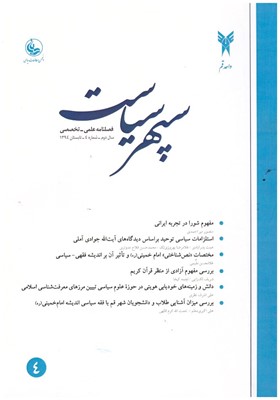تبیین رابطه ولی فقیه با رئیس جمهور از منظر فقه سیاسی
محورهای موضوعی : سیاست پژوهی ایرانی (سپهر سیاست سابق)
علی شیرخانی
1
![]() ,
امید خلیلی مهر
2
,
امید خلیلی مهر
2
1 - گروه علوم سیاسی، دانشگاه آزاد قم
2 - رشته علوم سیاسی، دانشگاه آزاد اسلامی قم
کلید واژه:
چکیده مقاله :
The subject of discussion is germane to an Islamic system based on the theory of jurisprudent’s authority, and from a jurisprudential and religious perspective, a fully qualified jurist must lead it on the one hand, and on the other hand, a president is introduced as the executive in‐charge of affairs. Thus, in the case of any trouble between them, what are the correct and logical solutions from the perspective of political jurisprudence? This paper investigates and elaborates on the relation between the two pillars of government in the Islamic system by analyzing the jurisprudential and religious principles and constitutional articles as to the supreme leader and president. Of the advantages of this discussion is that it evinces that if, from the perspective of religio‐jurisprudential principles, the supreme leader is in charge of all governmental affairs and has the right to deal with executive issues and affairs, the role of the president is either a ceremonial one or to the extent of an executive deputy, and the votes that people cast are either for the expediency of the Islamic society or out of kindness and favor to people on the part of the ruler. Assuming that, the supreme leader will, therefore, be accountable for the present issues and events; however, if a president is in charge of all executive affairs and holds a supervisory and controlling position, it is the president that will be responsible for events and the actions by members of the executive, given his executive power.
_||_

